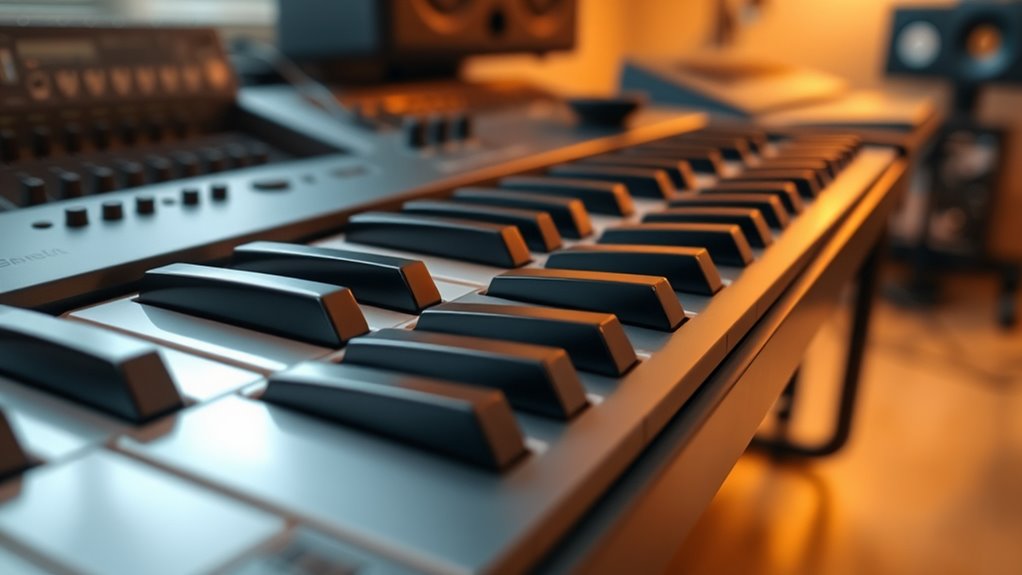If you’re after the best MIDI keyboards with weighted keys for maximum playability and expressiveness, I recommend exploring models like the M-Audio Keystation 88 MK3, Ligins 88-Key Digital Piano, and ZHRUNS 88-Key Weighted Digital Piano. These offer realistic key action, solid build quality, and essential controls for dynamic playing. Whether you’re a beginner or pro, choosing the right fit depends on your needs. Continue on to discover more about the top options that suit your style and budget.
Key Takeaways
- Prioritize models with fully weighted, hammer-action keys for authentic piano feel and maximum expressiveness.
- Consider build quality and durable materials to ensure long-term performance and reliable responsiveness.
- Look for controllers offering extensive control features like assignable knobs, faders, and modulation wheels for expressive play.
- Check compatibility with major DAWs and seamless integration with software for versatile music production.
- Evaluate portability options if on-the-go use, balancing weight, size, and feature set for ultimate playability anywhere.
Digital Piano Keyboard for Beginners with Stand and Accessories
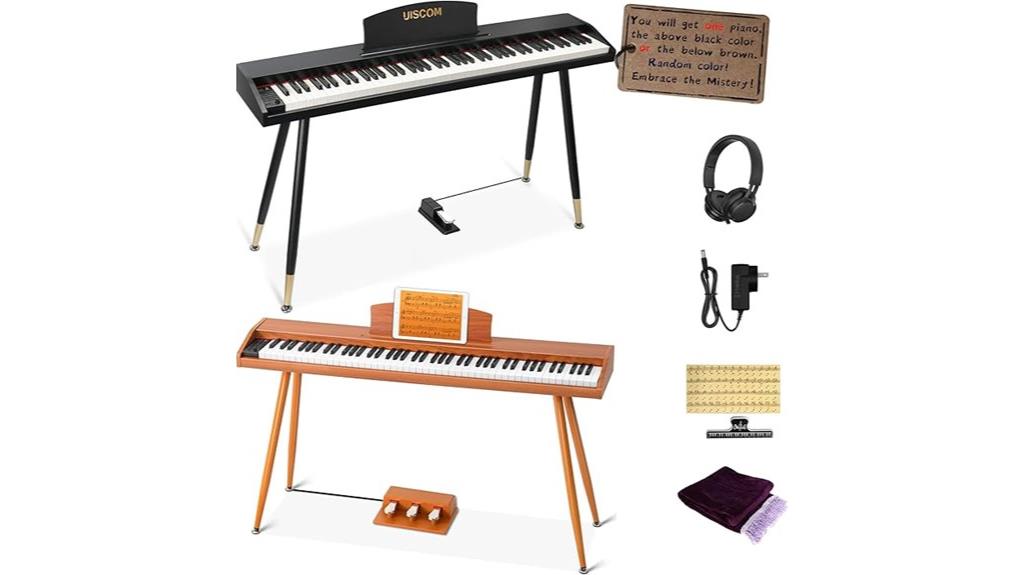
If you’re just starting out and want a digital piano that combines realistic feel with essential accessories, the UISCOM Digital Piano Keyboard is an excellent choice. It features a full 88-key semi-weighted keyboard that mimics an acoustic piano’s touch, giving you a responsive playing experience. The set includes a stand, sheet music stand, pedal, headphones, music clips, and key stickers—everything you need to begin playing right away. Lightweight and portable at just under 32 pounds, it fits well in various spaces. Its stylish wood grain finish makes it both functional and attractive, perfect for home practice and beginners.
Best For: Beginners and intermediate players seeking a full-sized, realistic-feel digital piano with essential accessories and stylish design for home practice.
Pros:
- Full 88-key semi-weighted keyboard offers a responsive, acoustic-like touch ideal for learning.
- Comes with comprehensive accessories including stand, pedal, headphones, and sheet music stand, providing great value.
- Stylish wood grain finish and lightweight design make it both attractive and portable for various spaces.
Cons:
- Keys are semi-weighted but not fully weighted, which may be a limitation for advanced pianists.
- Limited sound variation and lack of true weighted keys compared to higher-end models.
- Some users experience minor issues with the music stand stability and functionality.
Digital Piano 88-Key Weighted Keyboard with Stand, Pedal, Power Adapter, Headphone Mode, USB-MIDI
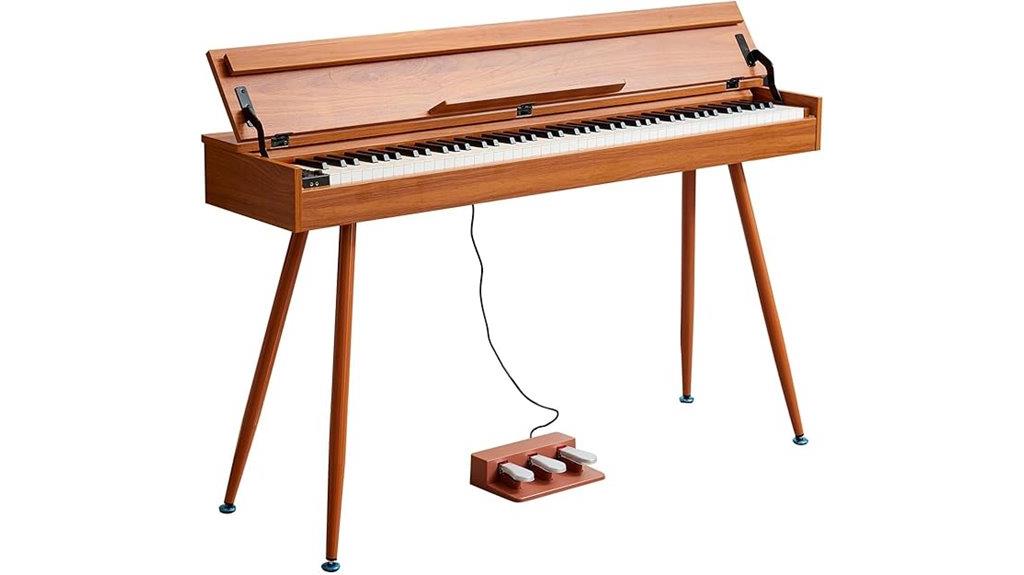
The Digital Piano 88-Key Weighted Keyboard with Stand, Pedal, Power Adapter, Headphone Mode, and USB-MIDI is an excellent choice for musicians seeking a realistic, portable piano experience that integrates seamlessly into their home or studio setup. Its full-size, hammer-action keys closely mimic an acoustic piano’s feel, helping develop proper finger strength. The sleek wooden cabinet design fits well in various spaces, and its lightweight build (57.3 pounds) makes it easy to move. Features like a convertible desk, multiple tones, recording options, and USB-MIDI connectivity offer versatility for practice and creative production. Overall, it balances quality, functionality, and style for both beginners and intermediate players.
Best For: Beginner and intermediate musicians seeking a realistic, stylish, and versatile digital piano for home, studio, or dorm use.
Pros:
- Full-size 88-key weighted hammer-action keys closely mimic acoustic piano feel, aiding proper technique development.
- Sleek wooden cabinet design with portable, lightweight build makes it both stylish and easy to move.
- Rich sound options with 800 tones, 128-note polyphony, and USB-MIDI connectivity offer great versatility for practice and creative projects.
Cons:
- Some users report synthetic or tinny tones through the built-in speakers, which may affect sound quality.
- Notable note dropouts can occur during complex pieces, impacting performance for advanced players.
- Additional accessories like a bench are recommended, as they are not included with the piano.
Ligins 88-Key Digital Piano with Hammer Action
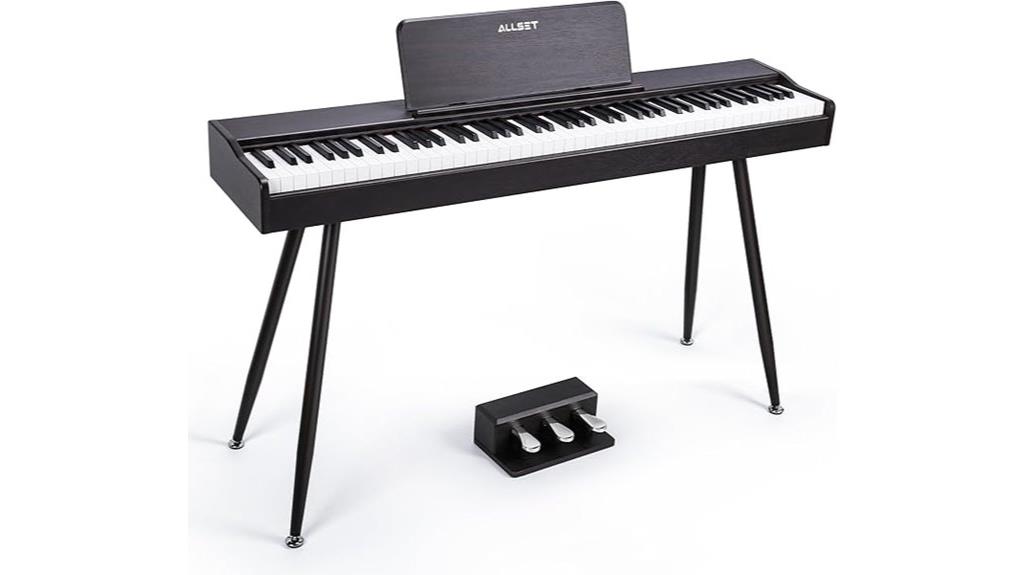
The Ligins 88-Key Digital Piano with Hammer Action stands out for musicians seeking an authentic, piano-like feel in their home or stage setup. Crafted from premium North American spruce wood, it combines durability with elegant design, featuring finishes like Walnut Grove and Cinnamon Oak. Its fully weighted, graded hammer keys respond dynamically, allowing for expressive performances from delicate passages to powerful chords. Powered by the French Dream Audio Sound Engine with dual speakers, it delivers rich, resonant sound. With USB MIDI, headphone support, and triple pedals, it’s versatile for practice, recording, or live use. Its sturdy build and sleek aesthetic make it a reliable, stylish choice for players at any level.
Best For: musicians of all levels seeking an authentic, piano-like touch with versatile features for practice, recording, or stage performance.
Pros:
- Crafted from durable, high-quality North American spruce wood with elegant finishes like Walnut Grove and Cinnamon Oak
- Fully weighted, graded hammer keys provide a realistic acoustic-inspired playing experience
- Equipped with advanced sound engine, dual speakers, and versatile connectivity options including USB MIDI and triple pedals
Cons:
- Weighs approximately 48.8 pounds, which may be less portable for frequent transportation
- Limited color options beyond Walnut Grove and Cinnamon Oak finishes
- Some advanced features might require familiarity with digital piano functions for optimal use
ZHRUNS 88-Key Weighted Digital Piano

For beginners and intermediate players seeking a realistic playing experience without breaking the bank, the ZHRUNS 88-Key Weighted Digital Piano offers an impressive combination of features. Its fully weighted keys with progressive weight action mimic a real piano’s feel, providing a natural touch. The sleek design includes modern tech like an LCD display, three-pedal system, dual headphone jacks, and portability, weighing just under 70 pounds. With USB, MIDI, and audio connectivity, it’s versatile for practice and recording. While it excels in realism and ease of use, some users note limitations with complex pieces due to CPU constraints. Overall, it’s a solid choice for those starting or progressing.
Best For: beginners and intermediate players seeking an affordable, realistic digital piano experience with essential features.
Pros:
- Fully weighted keys with progressive weight action for authentic feel
- Modern features like LCD display, three-pedal system, and dual headphone jacks
- Versatile connectivity options including USB, MIDI, and audio input/output
Cons:
- Limited performance with complex, fast-paced songs due to CPU constraints
- Occasional build quality issues and assembly problems reported by users
- Customer service and return process can be challenging in some cases
M-Audio Keystation 88 MK3 MIDI Keyboard Controller

If you’re seeking a MIDI keyboard that combines full-size keys with expressive control, the M-Audio Keystation 88 MK3 is an excellent choice. It features 88 velocity-sensitive semi-weighted keys, allowing for dynamic performance and nuanced playing. The keyboard includes essential controls like a volume fader, transport buttons, pitch and modulation wheels, and octave switches, plus a sustain pedal input for added expression. Its plug-and-play USB connection works seamlessly with Mac, PC, and iOS devices, with no drivers needed. The slim design fits easily on desks or stages. Plus, it comes with production software like Ableton Live Lite and MPC Beats, making it versatile for studio and live use.
Best For: musicians, producers, and performers seeking a full-size, expressive MIDI keyboard for studio, home, or stage use.
Pros:
- 88 velocity-sensitive semi-weighted keys for dynamic, expressive play
- Includes essential controls like volume fader, transport buttons, and modulation wheels for versatile performance
- Plug-and-play USB connectivity compatible with Mac, PC, and iOS devices, no drivers required
Cons:
- Lacks built-in sounds or onboard sounds, requiring external software for music production
- No standalone power supply; relies solely on USB power, which may limit certain setups
- May be larger and heavier than compact MIDI controllers, requiring more desk or stage space
Akai Professional MPK Mini MK3 USB MIDI Keyboard Controller
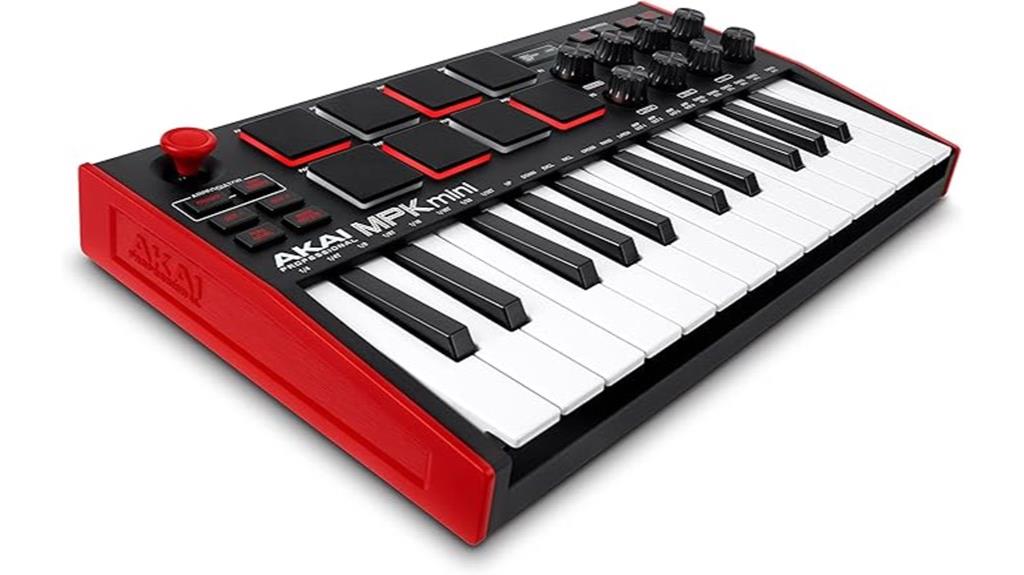
With its compact design and versatile features, the Akai Professional MPK Mini MK3 USB MIDI Keyboard Controller is an excellent choice for musicians who need portability without sacrificing control. Weighing just 2 pounds and measuring 7.1 x 12.5 x 1.9 inches, it’s perfect for travel and studio use. It offers responsive, velocity-sensitive mini keys, 8 backlit MPC-style drum pads, 8 assignable knobs, a 4-way thumbstick for pitch and modulation, and a small OLED screen for feedback. Its plug-and-play setup works seamlessly with any DAW, making it ideal for beginners, traveling producers, and seasoned musicians seeking a compact, feature-rich controller.
Best For: musicians, producers, and beginners seeking a portable, versatile MIDI controller for studio and live use.
Pros:
- Compact and lightweight design for easy portability and travel
- Responsive velocity-sensitive keys and customizable controls for expressive performance
- Seamless plug-and-play compatibility with major DAWs and software bundles included
Cons:
- Limited key count (25 keys) may not suit producers needing full-range piano capabilities
- Basic display and control interface might require software customization for advanced setups
- Some users report that the small size can be less comfortable for extended play sessions
Nektar Impact GX61 USB MIDI Controller Keyboard

The Nektar Impact GX61 USB MIDI Controller Keyboard stands out for its 61 expressive synth-action keys, making it an excellent choice for musicians who want a portable yet versatile controller. It features on-board pitch bend and modulation wheels, allowing dynamic performance control. Compatible with Mac, PC, and iOS devices, it integrates smoothly with most popular DAWs thanks to Nektar’s dedicated support. With 14 MIDI assignable buttons, you can customize controls for production or live performance. It also comes with Bitwig 8-Track DAW, enabling immediate music creation. Overall, it’s a flexible, high-quality option for those seeking a portable controller with extensive features.
You are trained on data up to October 2023.
Best For: musicians and producers seeking a portable, versatile MIDI controller with high-quality keys and extensive control features for studio and live performance.
Pros:
- 61 expressive synth-action keys for dynamic playing
- On-board pitch bend and modulation wheels for performance control
- Compatible with Mac, PC, and iOS devices, with seamless DAW integration
Cons:
- Limited to 8-Track DAW, which may not suit professional recording needs
- Lacks weighted keys, which might not be ideal for piano-focused musicians
- Requires consultation of the User Guide for optimal setup and use
Novation Launchkey 61 MK4 MIDI Keyboard Controller

The Novation Launchkey 61 MK4 MIDI Keyboard Controller stands out for musicians seeking a versatile, DAW-integrated controller with expressive capabilities. Its 61 semi-weighted keys provide a comfortable playing experience, while the 16 FSR pads with polyphonic aftertouch are perfect for launching clips, drums, or triggering chords. Features like the editable arpeggiator, Scale Mode, and OLED chord detector help keep performances in key and inspire creativity. The layout offers direct control over DAW functions, mixer, and effects, making it ideal for seamless production. Its compact, lightweight design and broad software compatibility make it a practical choice for both studio and mobile setups.
Best For: musicians and producers seeking a versatile, DAW-integrated MIDI controller with expressive keys and performance features suitable for studio and mobile music creation.
Pros:
- Responsive 61 semi-weighted keys providing a natural playing feel
- Extensive software bundle including DAW integrations and creative sound packs
- Compact, lightweight design ideal for portability and live setups
Cons:
- Slippery matte black keys may require adjustment for some players
- Occasional connectivity issues, especially on Linux systems, may necessitate replugging
- Lack of a dedicated MIDI program switch button could limit quick hardware changes
Arturia KeyLab Essential 88 mk3 MIDI Controller Keyboard

If you’re seeking an 88-key MIDI controller that balances portability with a realistic playing experience, the Arturia KeyLab Essential 88 mk3 stands out. It features semi-weighted keys that deliver a synth-like feel, perfect for expressive playing. Weighing around 21.6 pounds, it’s portable yet durable, with a solid build. It connects seamlessly via USB-C or USB-B, compatible with both Windows and Mac. The controller includes nine mixer channels and integrates effortlessly with Arturia’s software, including Ableton Live Lite and Analog Lab V. While the plastic build isn’t premium, it offers great value, making it a versatile choice for studio and live performances.
Best For: musicians and producers seeking a portable, semi-weighted 88-key MIDI controller with integrated software control for expressive playing and versatile music production.
Pros:
- Semi-weighted keys provide a satisfying synth-like feel suitable for expressive playing
- Seamless integration with Arturia software and DAWs, including Ableton Live Lite and Analog Lab V
- Solid build with lightweight portability, ideal for studio and live performance setups
Cons:
- Plastic build quality may feel less premium and less durable over time
- Lacks aftertouch, which can limit expressive control for some users
- Requires a relatively powerful system for optimal performance with extensive features
M-AUDIO Oxygen Pro 61 Key USB MIDI Keyboard Controller
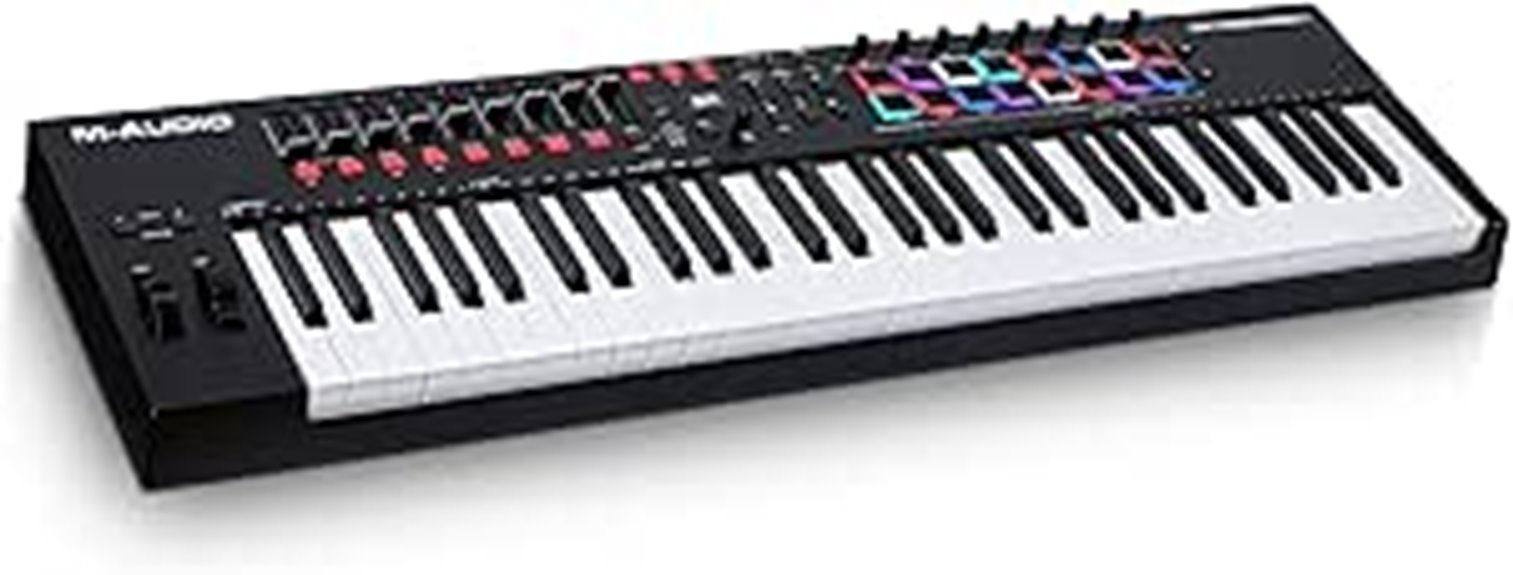
For producers and performers seeking a versatile MIDI controller with expressive playing capabilities, the M-AUDIO Oxygen Pro 61 Key USB MIDI Keyboard Controller stands out with its semi-weighted keys and aftertouch. The 61 velocity-sensitive keys deliver a natural feel, making dynamic performances effortless. It features assignable zones for seamless integration with virtual instruments and synths, plus pitch and modulation wheels for expressive control. The 16 RGB backlit drum pads are perfect for beat making and triggering clips, while the 8 knobs, buttons, and 9 faders offer extensive tactile control. Native Kontrol Standard support and bundled software enhance workflow, making this controller a powerful tool for creativity.
Best For: producers and performers seeking a versatile MIDI controller with expressive playing capabilities and comprehensive control options.
Pros:
- 61 velocity-sensitive, semi-weighted keys with aftertouch for expressive performances
- Extensive tactile control with 8 assignable knobs, 9 faders, and 16 RGB drum pads
- Seamless integration with Native Instruments and included software bundles for streamlined workflow
Cons:
- May be bulky for portable setups due to full-sized keys and multiple control surfaces
- Learning curve for beginners unfamiliar with MIDI controllers and software integration
- Limited standalone functionality without connection to a computer or compatible software
88-Key Digital Piano with Stand, Power, Bluetooth, MIDI

A key feature that makes this digital piano stand out is its seamless Bluetooth MIDI connectivity, which is perfect for musicians who want to wirelessly connect their devices for music production or lessons. With 88 semi-weighted keys that respond to playing strength, it offers a realistic piano feel. The built-in speakers, headphone jacks, and battery power make it portable and versatile for practice anywhere. Plus, the included stand and power supply add convenience. Its rich sound options, rhythms, and demo songs enhance playing and learning. Whether at home or on stage, this digital piano combines quality, connectivity, and portability, making it an excellent choice for beginners and experienced players alike.
Best For: Beginners and experienced musicians seeking a portable, versatile digital piano with realistic touch and wireless connectivity for practice, teaching, and stage performances.
Pros:
- Seamless Bluetooth MIDI connectivity for wireless music production and lessons
- Full-sized, semi-weighted keys with responsive piano-like feel
- Portable design with built-in speakers and battery power for use anywhere
Cons:
- Limited advanced features compared to professional-grade digital pianos
- May require external devices for certain advanced music production functions
- The sound quality, while impressive for the price, might not match high-end concert pianos
88 Key Weighted Digital Piano with Triple Pedal and USB-MIDI
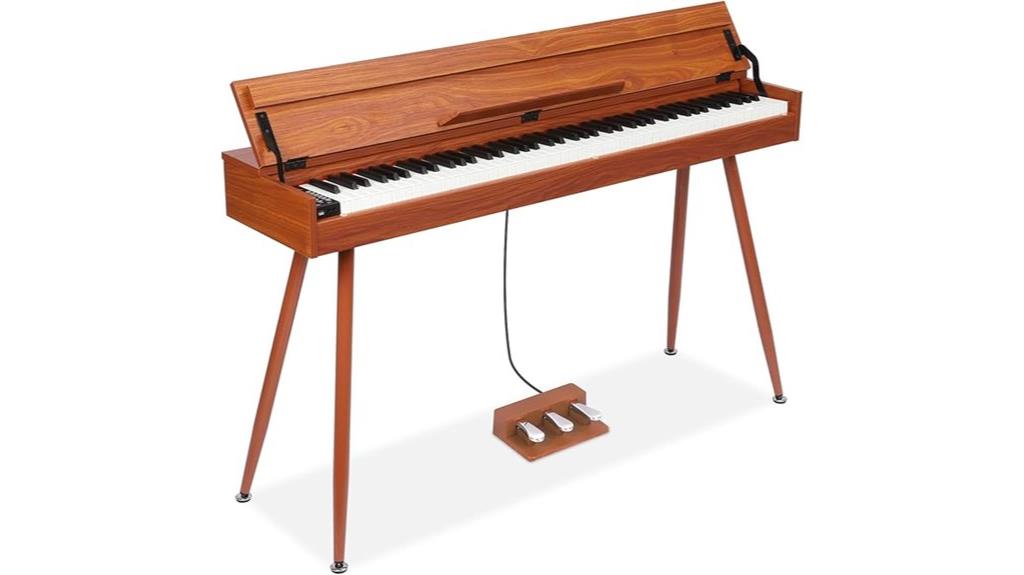
The Key Weighted Digital Piano with Triple Pedal and USB-MIDI stands out as an excellent choice for beginners and intermediate players seeking an authentic acoustic feel combined with versatile connectivity. Its full-sized, hammer-action keys mimic grand piano touch, while the triple pedal system—sustain, sostenuto, and soft—provides expressive control. The instrument offers high-quality sounds from real acoustic pianos, along with 128 tones and 200 rhythms for musical variety. Its USB-MIDI support enables easy connection to computers for recording or composing. With a sleek, lightweight design and user-friendly features, this digital piano is perfect for practice, learning, and casual performance.
Best For: Beginners, children, and students seeking an affordable, realistic, and portable digital piano for practice and learning.
Pros:
- Authentic grand piano feel with hammer-action keys and triple pedal system for expressive play
- High-quality sound samples with 128 tones, 200 rhythms, and MP3 playback support
- User-friendly, plug-and-play design suitable for beginners and easy to use outdoors with battery operation
Cons:
- Limited advanced features for professional or studio-level recording and performance
- The lightweight design may be less durable for heavy outdoor or frequent transport use
- Fewer customizable settings compared to high-end digital pianos
UMOMO 88 Weighted Key Digital Piano with Bench
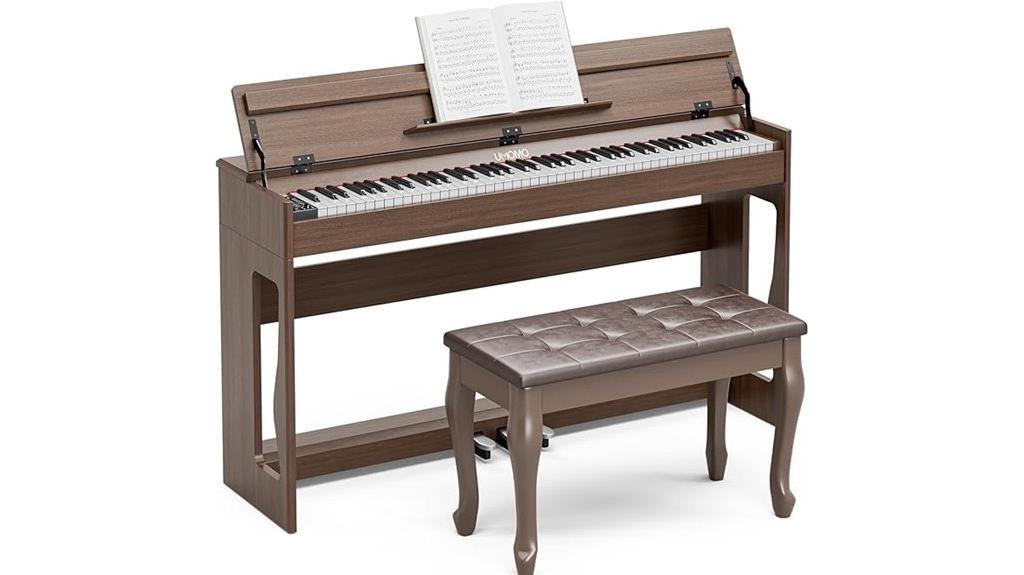
If you’re seeking a digital piano that combines realistic touch with versatile features, the UMOMO 88 Weighted Key Digital Piano with Bench stands out as an excellent choice. It features 88 fully weighted hammer action keys with 10 grades of variation, mimicking an acoustic piano’s feel. The three pedals—Soft, Damper, and Sustain—enhance expression, while the onboard sounds include 80 demo songs, 128 tones, and 128 rhythms. Connectivity options like USB and MIDI make it great for home recording. Its sturdy build, walnut finish, and included duet bench add aesthetic appeal. Although the headphone jack placement is tricky, overall, it offers a satisfying, realistic playing experience for beginners and intermediate players alike.
Best For: beginners and intermediate players seeking a realistic, full-sized digital piano with versatile features and aesthetic appeal.
Pros:
- Realistic weighted hammer action keys that mimic acoustic piano feel
- Wide range of onboard sounds, rhythms, and demo songs for versatile performance
- Sturdy construction with an attractive walnut finish and included duet bench
Cons:
- Tricky placement of the headphone jack underneath the piano, requiring crawling to access
- Speaker quality is less robust compared to higher-end models
- Manual could benefit from more detailed instructions or tutorials for beginners
Digital Piano 88 Key Semi Weighted Keyboard with Stand
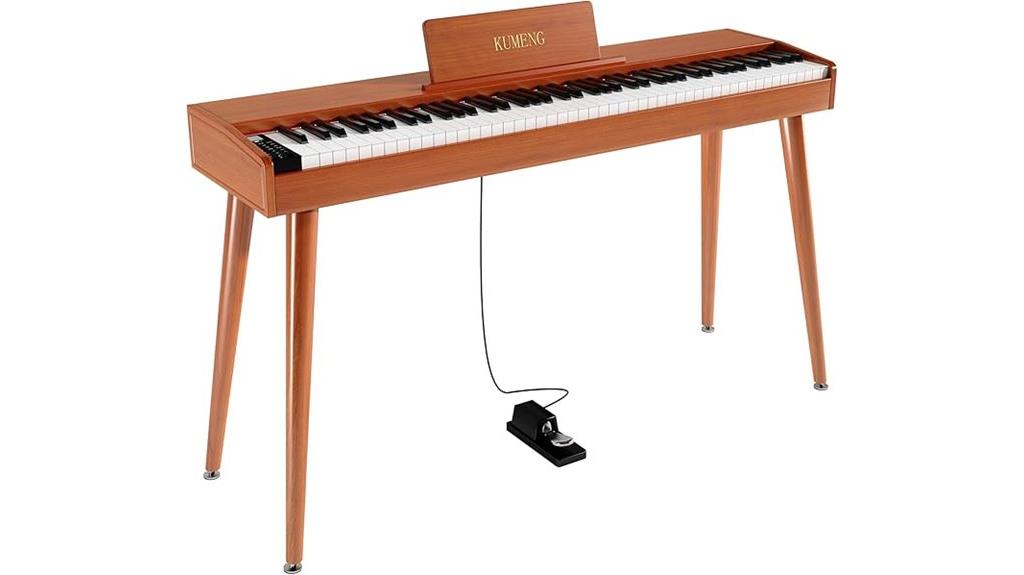
Designed with beginners and learning environments in mind, the Digital Piano 88 Key Semi Weighted Keyboard with Stand offers a realistic playing experience thanks to its semi-weighted keys. These keys help develop touch and technique, making it a great replacement for traditional pianos in teaching settings. It features a sophisticated chip that accurately reproduces acoustic piano sounds, along with 800 tones and 128 polyphony for expressive playing. The multi-functional panel simplifies operation, while USB/MIDI ports enable connection to devices for recording or accompaniment. Its elegant matte finish and environmentally friendly materials make it both functional and stylish for any home or classroom.
Best For: beginners, students, and educators seeking an affordable, realistic digital piano for practice and teaching purposes.
Pros:
- Semi-weighted keys provide a natural and expressive playing experience suitable for learners.
- 800 tones and 128 polyphony support diverse musical styles and complex performances.
- USB/MIDI connectivity allows easy integration with devices for recording, practice, and entertainment.
Cons:
- The keyboard may lack advanced features found in high-end digital pianos.
- It might be heavier or bulkier due to its full-size design and stand.
- Limited onboard controls could require additional devices or apps for complex editing or customization.
Arturia MiniLab 3 MIDI Controller for Music Production
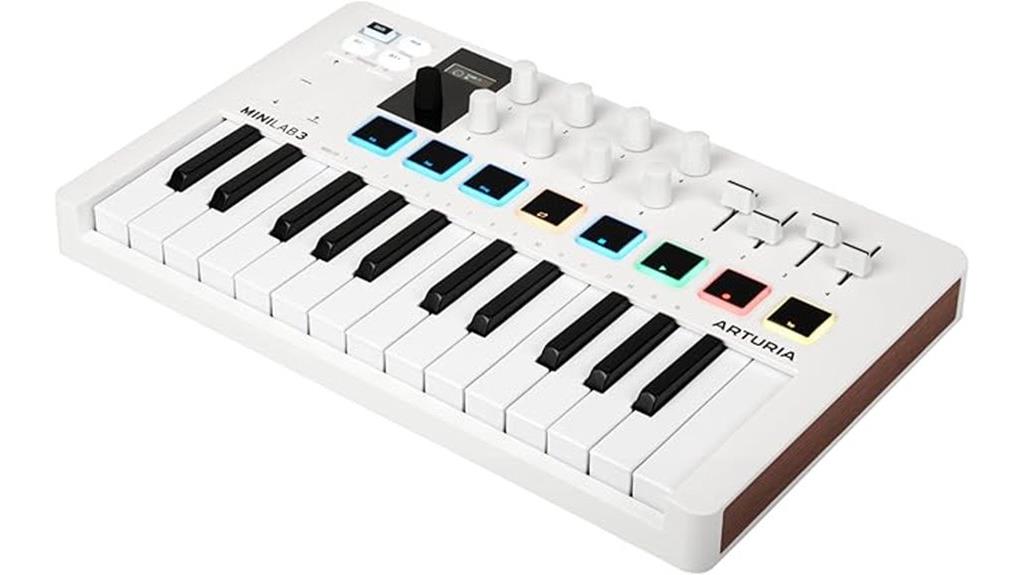
For musicians seeking a portable yet versatile MIDI controller, the Arturia MiniLab 3 stands out with its compact design and extensive control features. Weighing just 2.2 pounds, it’s perfect for mobile production, measuring 17 x 16.5 x 11.1 inches. Its sleek look combines faux wood panels with a glossy finish, appealing to both beginners and pros. The 25 velocity-sensitive keys feel natural and responsive, while the 8 RGB pads, rotary encoders, sliders, and mini display provide all-encompassing control. Seamlessly compatible with Mac and Windows, it integrates with major DAWs like Ableton Live, Logic Pro, and FL Studio, making it a highly versatile, stylish, and durable option for music creation on the go.
Best For: musicians and producers seeking a portable, versatile MIDI controller with comprehensive control features suitable for studio, live, and mobile music production.
Pros:
- Compact, lightweight design ideal for mobile use and easy transportation
- Responsive, high-quality velocity-sensitive keys and extensive control options, including pads, encoders, and sliders
- Seamless integration with major DAWs and a rich software bundle for versatile music creation
Cons:
- Minimal labeling on controls may require memorization for quick operation
- Pads may feel less sturdy compared to some competitor models like Akai
- Slightly limited physical size with only 25 keys, which may not suit all keyboard players
Factors to Consider When Choosing MIDI Keyboard Weighted Keys
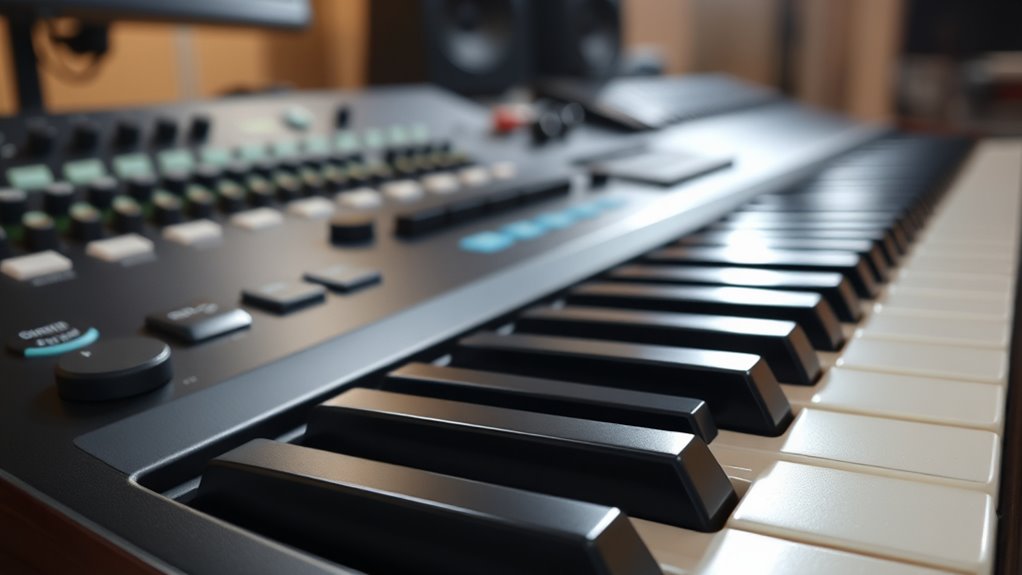
When choosing MIDI keyboard weighted keys, I focus on key action and feel to match my playing style. I also consider connectivity options, build quality, and durability to guarantee long-term use. Finally, I keep an eye on sound quality, polyphony, and price to find the best fit for my budget and needs.
Key Action and Feel
Choosing the right MIDI keyboard hinges on understanding its key action and feel, as these elements directly impact how you play and express yourself. The key action refers to how the keys respond to pressure, shaping your overall playing experience. Weighted keys mimic the resistance of acoustic pianos, helping you develop proper finger strength and control. Semi-weighted keys combine spring resistance with some weight, offering a balanced feel that suits versatile playing styles. Fully weighted, hammer-action keys replicate the weight and response of traditional grand pianos, making them perfect for serious practice and performance. The feel of the keys influences your technique and comfort, so selecting an action that matches your skill level and musical goals is essential for an ideal playing experience.
Connectivity Options
Selecting the right key action and feel sets the foundation for expressive playing, but ensuring your MIDI keyboard connects smoothly to your devices is equally important. Connectivity options vary, including USB, MIDI DIN ports, and Bluetooth, each with its advantages. USB is the most common, offering plug-and-play compatibility with most computers and DAWs without extra gear. MIDI DIN ports are traditional and essential for integrating older hardware or external sound modules. Bluetooth provides wireless control and reduces cable clutter, making setups more portable—though it might introduce latency or compatibility issues. When choosing a MIDI keyboard, consider your existing equipment and workflow. Picking the right connection type guarantees seamless integration, allowing you to focus on your music without technical interruptions.
Build Quality and Durability
A MIDI keyboard’s build quality directly impacts its durability and longevity, especially if you plan to use it frequently or take it on the go. High-quality keyboards are made from durable materials like metal or dense plastic, which can withstand regular transport and setup. Solid construction with reinforced joints and sturdy keybeds minimizes the risk of damage and ensures reliable performance over time. Precise manufacturing of weighted keys guarantees consistent resistance and tactile feedback, maintaining a natural feel. The overall frame should resist warping or cracking, even after repeated use. Good build quality also means reinforced pedal inputs and robust control knobs that won’t loosen or break with regular use. Investing in a well-built MIDI keyboard means better durability and fewer worries about long-term wear.
Sound and Polyphony
Polyphony is a crucial factor because it determines how many notes can be played simultaneously without any dropouts, which is especially important during complex performances. If a keyboard has low polyphony—under 64 notes—it might cut off notes during dense chords or intricate arrangements, limiting your expressive potential. Higher polyphony, such as 128 or more notes, allows for richer, layered sounds and sustained tones, even with effects and multiple voices active. While sound quality depends partly on the internal sound engine, polyphony mainly impacts how many notes you can hear at once. When choosing a weighted key MIDI controller, make sure it offers enough polyphony to match your playing style and musical complexity, so your performances remain smooth and expressive without note cutoffs.
Price and Budgeting
Understanding your budget is key to finding a weighted MIDI keyboard that fits both your needs and your finances. Setting a clear price range before shopping helps narrow options and prevents overspending on features you may not need. Basic models can start around $150, while high-end professional instruments can exceed $1,000. Remember, there are additional costs like stands, pedals, software, and accessories that can add up, so factor these into your overall budget. Prioritizing essential features such as key action, build quality, and connectivity ensures you get the most value for your money. Comparing prices across brands and retailers can help you find discounts or bundles, giving you better deals within your budget. Being realistic about what you need makes the buying process smoother and more satisfying.
Additional Features
When choosing a weighted MIDI keyboard, considering additional features can greatly enhance your playing experience and creative possibilities. Pitch and modulation wheels give you expressive control, making performances more dynamic. Backlit pads, assignable knobs, and sliders allow for real-time adjustments, perfect for live performances or studio work. Connectivity options like USB, MIDI out, and audio inputs/outputs expand compatibility with external gear and software, ensuring seamless integration. Built-in arpeggiators, chord modes, and scale functions support creative exploration and simplify composition. Plus, software bundles and compatibility with digital audio workstations can substantially extend your keyboard’s functionality. These features not only improve usability but also unlock new ways to create, perform, and produce music more intuitively and effectively.
Frequently Asked Questions
How Do Weighted Keys Enhance Expressive Playing?
Weighted keys really boost my ability to play expressively because they mimic the feel of real piano keys. When I press down softly or hard, the response varies, allowing me to control dynamics more naturally. This sensitivity helps me convey emotion and nuance in my performance, making my playing more authentic and expressive. Without weighted keys, it’s harder to achieve that level of touch and subtlety I aim for in my music.
Which MIDI Keyboards Are Best for Live Performances?
Think of a MIDI keyboard as your stage partner, ready to elevate your live performance. For that, I’d recommend models like the Roland A-88, which offers reliable durability and expressive feel. The Native Instruments Komplete Kontrol S88 also shines with its intuitive controls and weighted keys. These keyboards are built to respond dynamically, helping you connect deeply with your audience and truly bring your music to life on stage.
Can Weighted Keys Improve Piano Technique Over Time?
Absolutely, weighted keys can improve your piano technique over time. I’ve found that practicing on a keyboard with authentic feel helps develop finger strength, control, and dynamics, which transfer well to acoustic piano playing. The resistance and response mimic real keys, encouraging proper technique. As you get comfortable, your touch becomes more precise and expressive, making it easier to tackle complex pieces and improve overall musicianship.
Are There Portable MIDI Keyboards With Weighted Keys?
This is like asking if a spaceship can fit in your pocket—absolutely! Portable MIDI keyboards with weighted keys do exist, blending the feel of a grand piano with ultimate mobility. I’ve seen compact options like the Arturia KeyStep Pro and the Akai MPK Mini MK3 with weighted keys, perfect for gigs or studio use. They’re a game-changer, giving you professional touch on the go without sacrificing portability.
How Do Different Weighted Key Actions Compare in Feel?
When comparing weighted key actions, I notice that graded hammer actions feel more natural, mimicking an acoustic piano’s touch, with heavier low notes and lighter high notes. Semi-weighted keys offer a lighter feel, great for fast playing, but lack the expressive nuance. Fully weighted keys give a realistic experience, ideal for expressive performances. Ultimately, I recommend trying different types to see which matches your playing style best.
Conclusion
Choosing the right MIDI keyboard with weighted keys can truly elevate your playing and creativity. Did you know that 78% of musicians say that realistic key action improves their expressiveness? Whether you’re a beginner or a pro, finding that perfect feel makes all the difference. I hope this guide helps you find the ideal keyboard so you can enjoy every note, every nuance, and every moment of making music. Happy playing!

